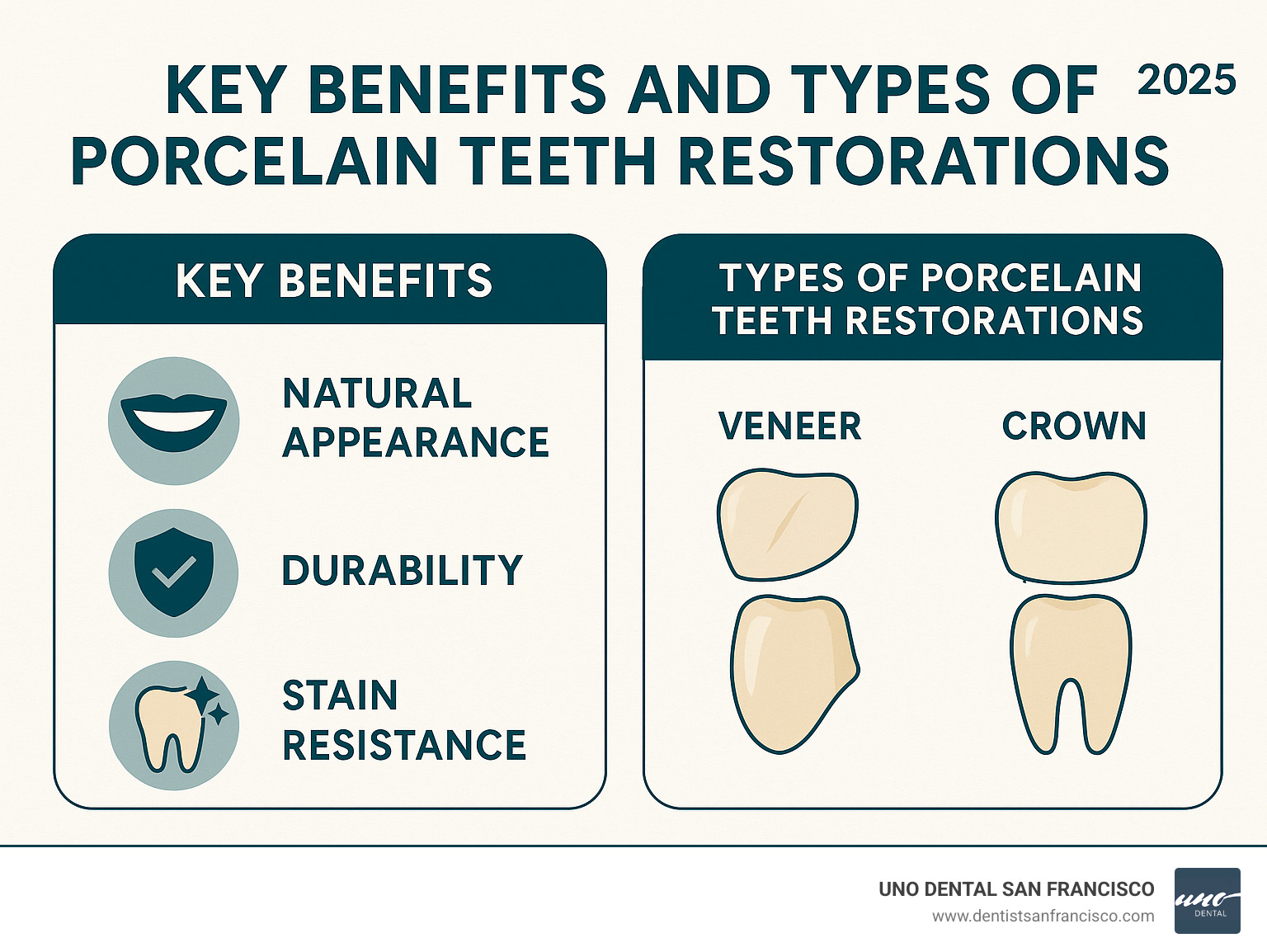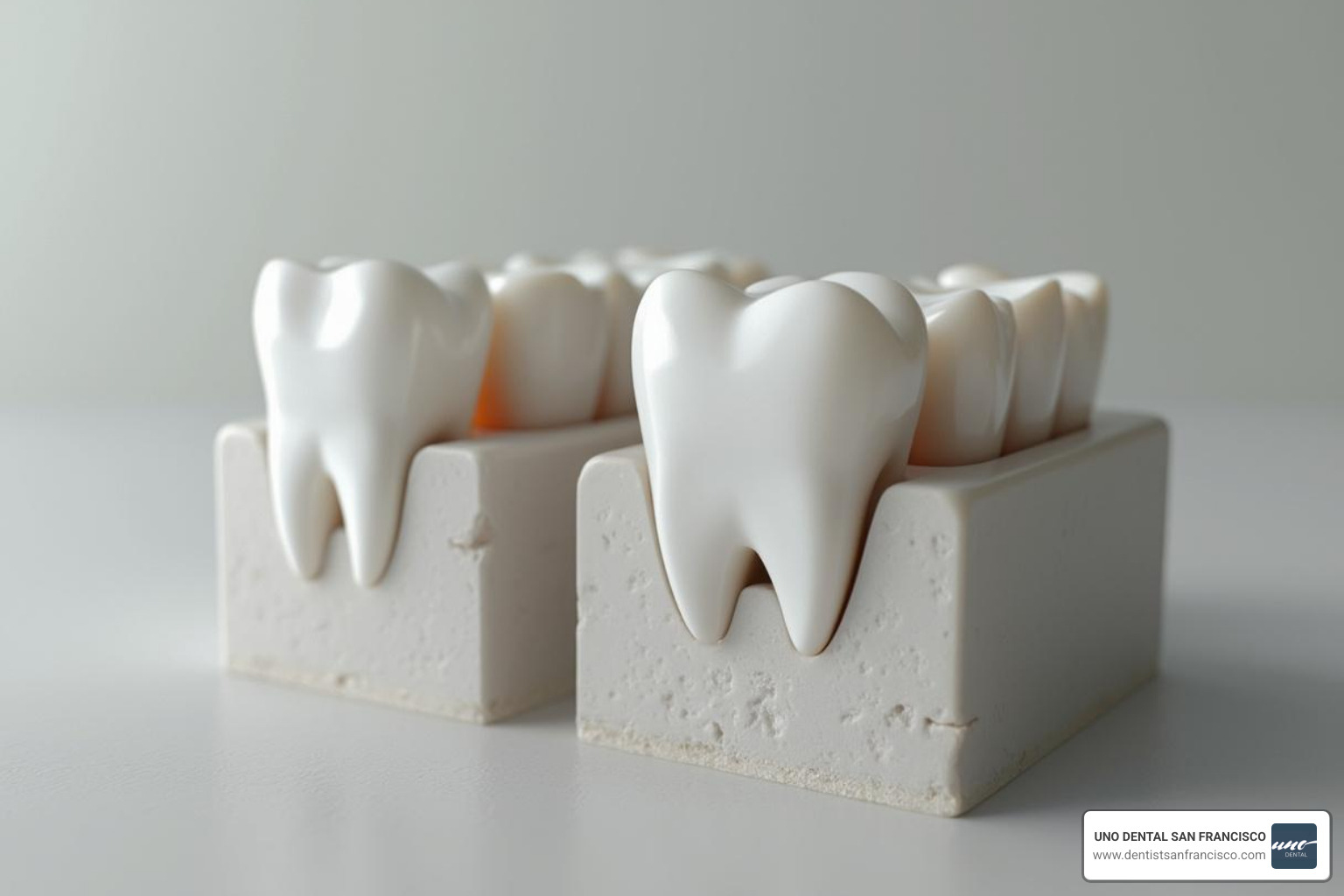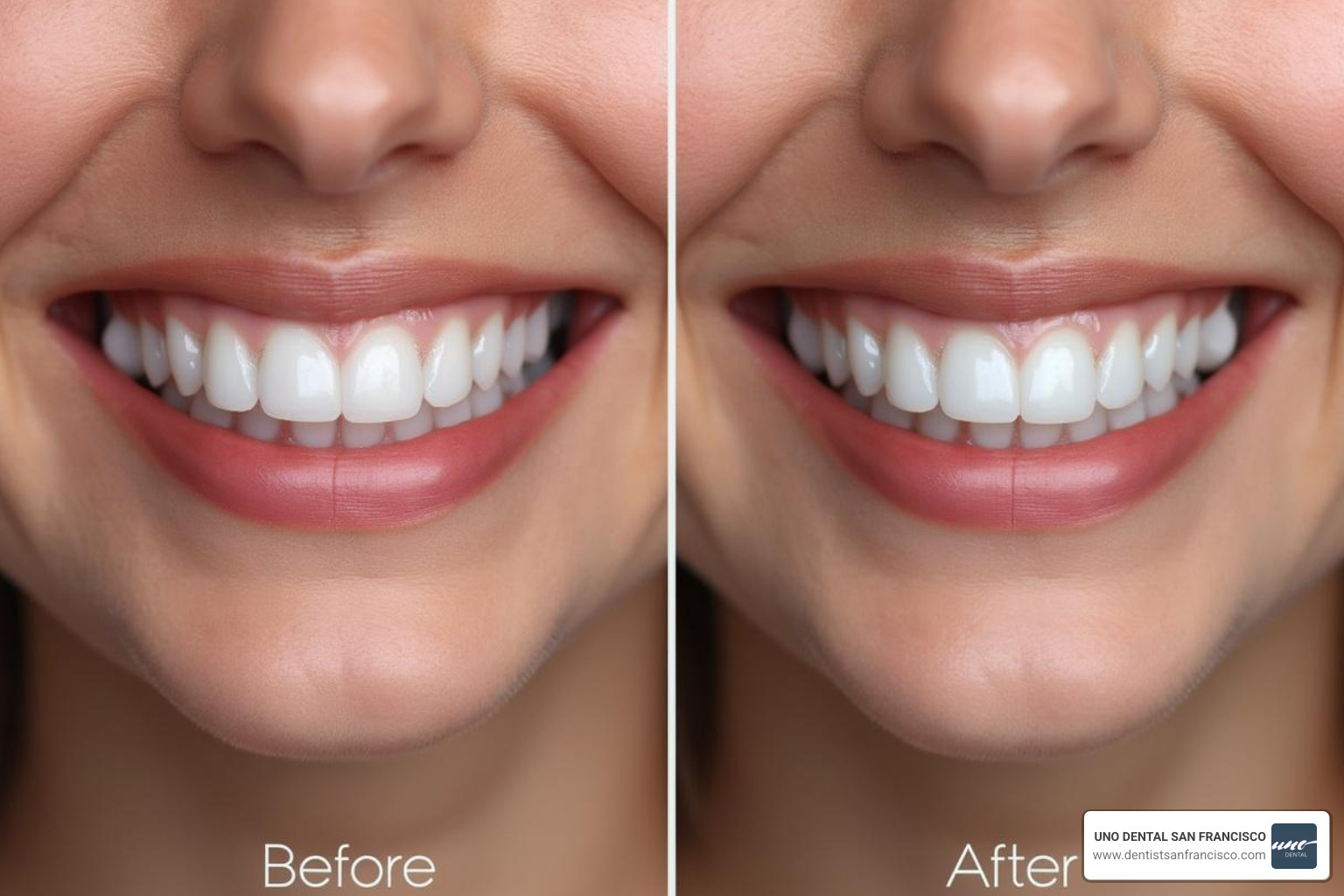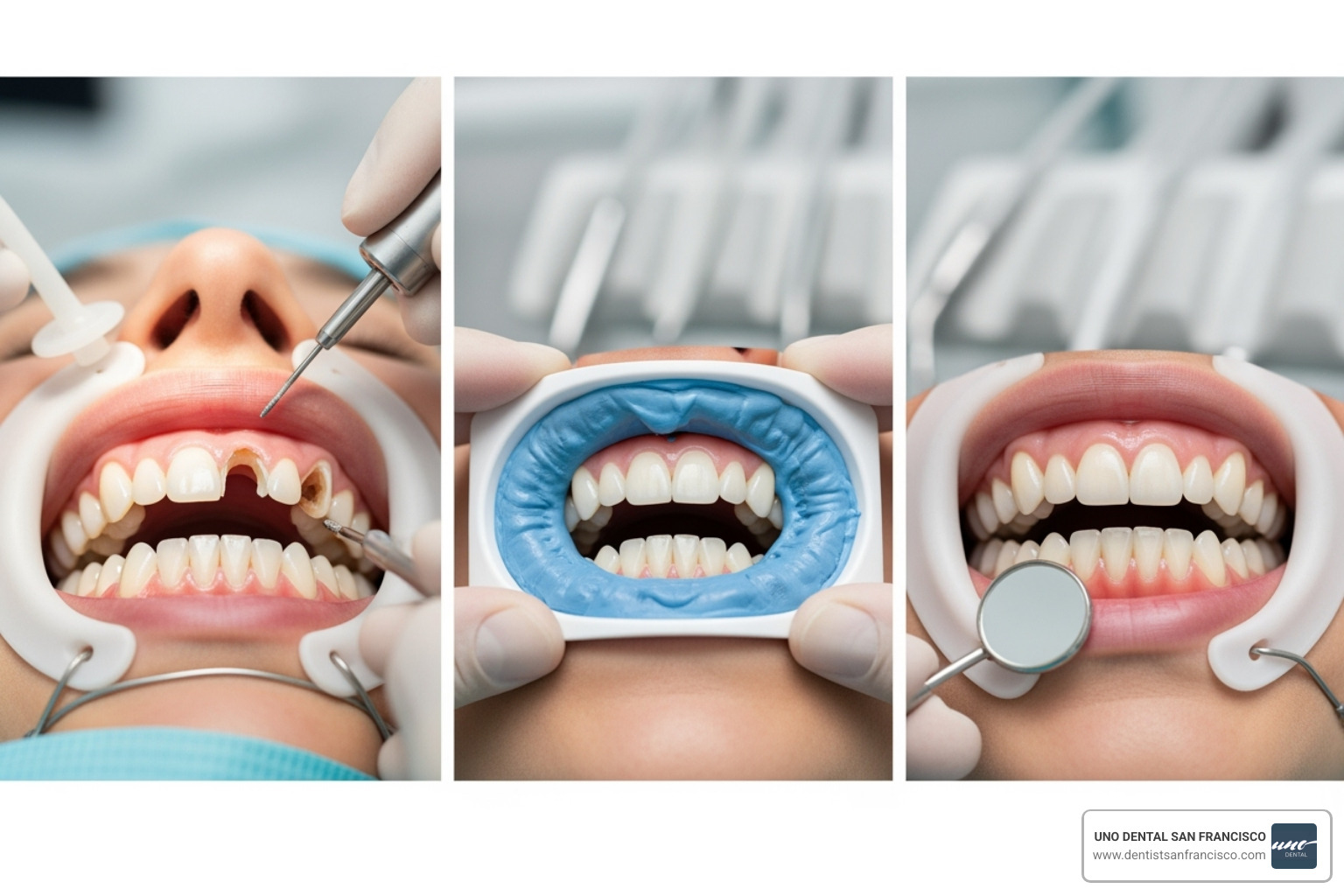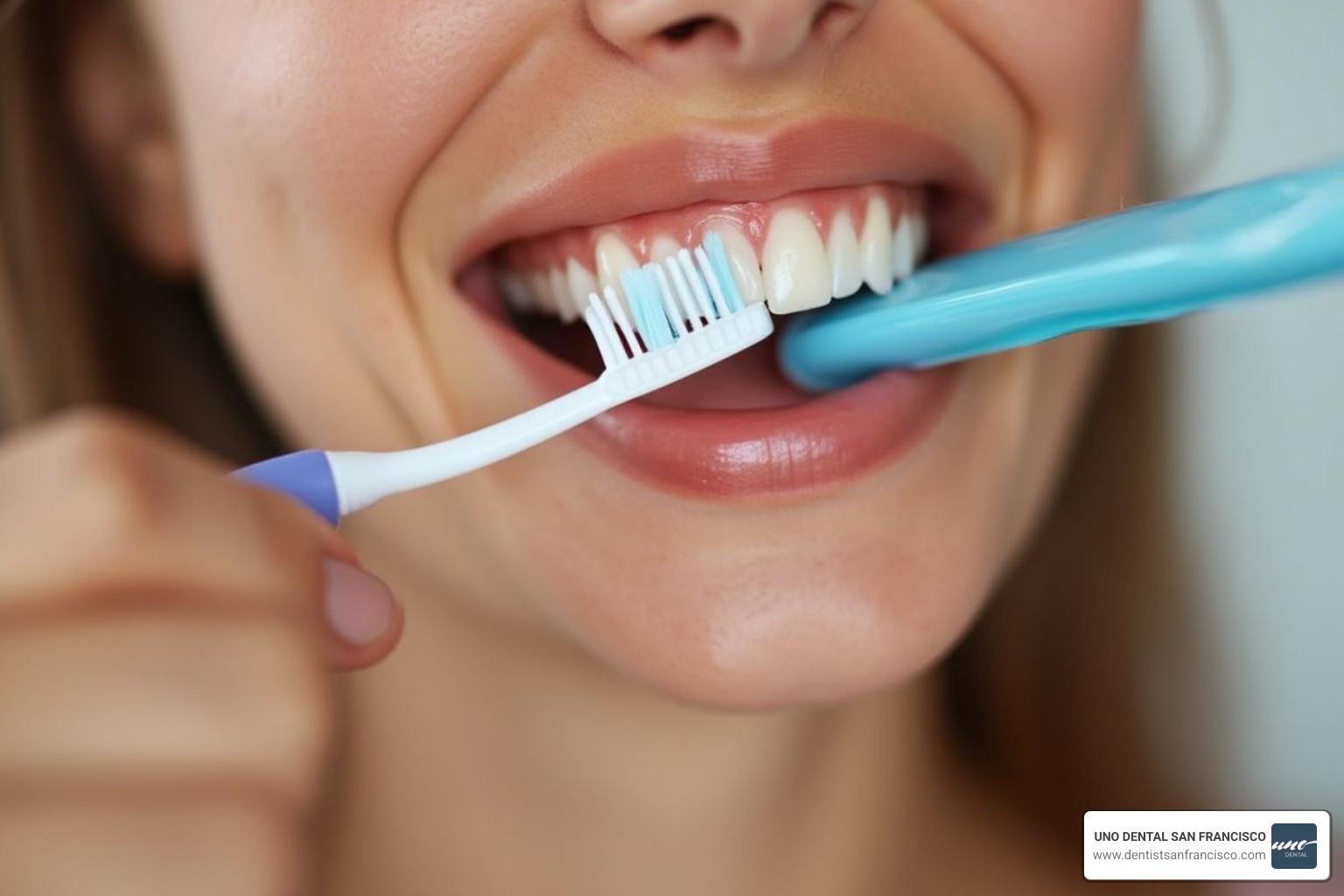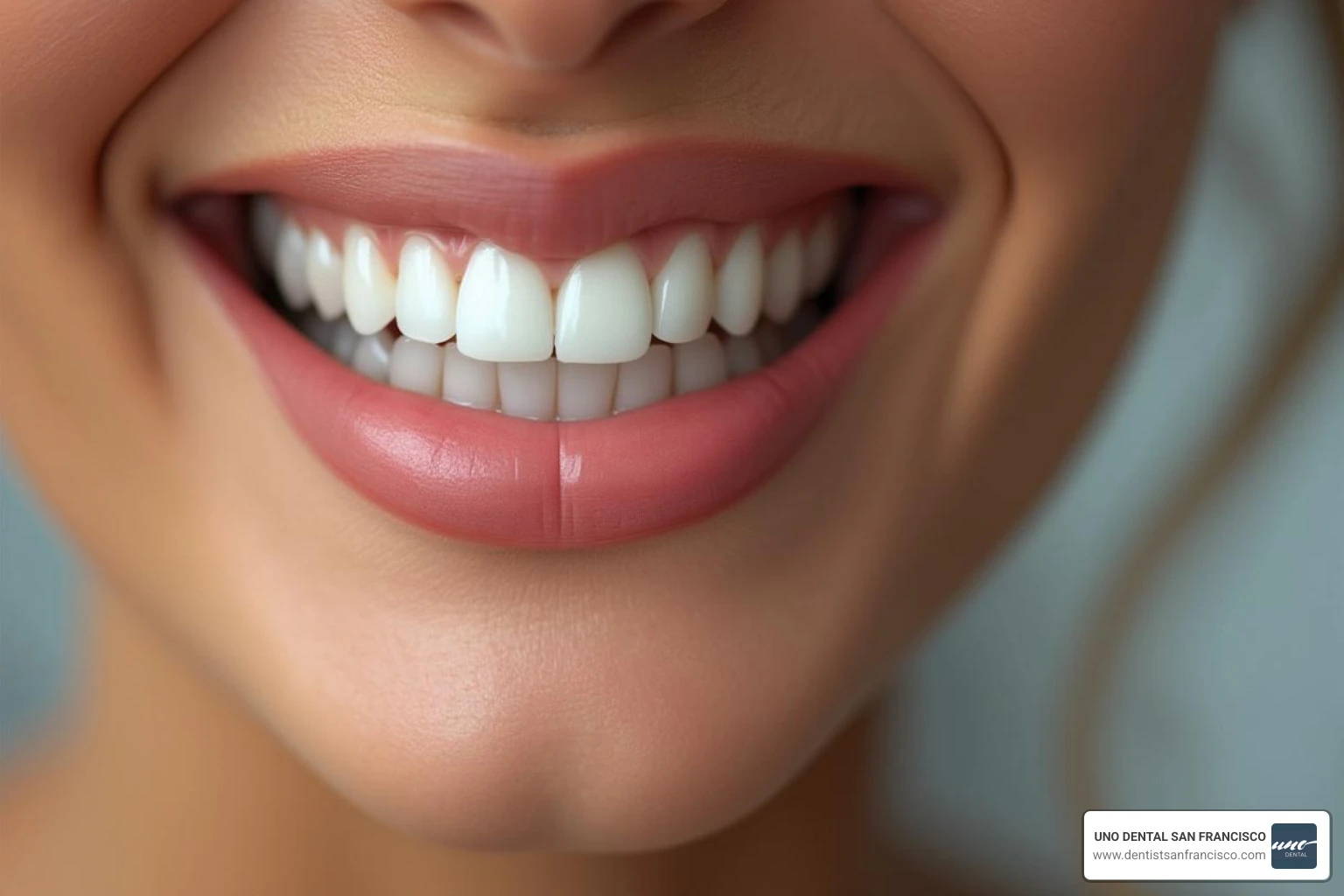
Open up Your Smile Potential with Porcelain Teeth
If you're thinking about improving your smile, porcelain teeth offer a durable and natural-looking solution for many common dental concerns. A leading solution in cosmetic dentistry, they can transform your appearance by correcting imperfections like discoloration, chips, gaps, and uneven teeth.
Here’s a quick overview:
- What are they? Thin, custom-made ceramic shells (veneers) or full tooth covers (crowns) that mimic natural tooth enamel.
- What do they fix? Stains, chips, gaps, minor misalignments, and damaged or worn-down teeth.
- How long do they last? Typically 10 to 20 years or more with good care.
This guide will walk you through everything you need to know about these popular dental restorations.
As Dr. Mohammad Aghiad Kandar, I've seen how porcelain teeth can transform smiles, bringing over 15 years of expertise in advanced cosmetic and restorative dental solutions. My commitment to patient-focused, high-tech care at UNO DENTAL SAN FRANCISCO ensures every smile journey is seamless and successful.
What Are Porcelain Teeth? Understanding the Material and Its Uses
Porcelain teeth are dental restorations crafted from dental porcelain, or dental ceramic. This unique material is designed to be biocompatible, look incredibly natural, and stand the test of time.
Dental porcelain is a blend of materials, often featuring Feldspar, Quartz for strength, and a touch of Kaolin. Metallic colorants and glass are added to achieve a perfect, natural shade. This recipe creates a material that is tough (a 7 on the Mohs hardness scale), highly biocompatible, and remarkably stain-resistant. This ensures your new smile will blend seamlessly and stay bright for years. For those interested, scientific research on dental ceramics provides more detail.
Because of these qualities, dental porcelain is a superstar in dentistry, used for restorations like veneers, crowns, inlays, and onlays.
Porcelain Veneers: The Ultimate Smile Makeover
Porcelain veneers are ultra-thin, custom-made shells bonded to the front surface of your teeth. Their purpose is cosmetic improvement, as they can dramatically improve the color, perfect the shape, adjust the size, and subtly correct the alignment of your teeth to achieve a picture-perfect smile.
Porcelain Crowns: Restoring Form and Function
While veneers are a cosmetic facade, porcelain crowns are a protective helmet for your tooth, encasing the entire structure. Their main mission is restorative: to provide strength and protection to teeth that are badly damaged, worn down, or have extensive decay. A crown brings a compromised tooth back to full function while shielding it from further harm.
The History of Porcelain in Dentures
Porcelain teeth were once the gold standard for dentures due to their durability and appearance. However, dental science revealed significant drawbacks. The hardness of porcelain caused excessive wear on opposing natural teeth and could accelerate jawbone loss by transferring chewing forces too intensely. Patients also reported a "clicking" sound when eating. Due to these challenges and the development of advanced acrylics, porcelain is no longer the preferred material for modern dentures.
The Power of Porcelain Veneers: Changing Your Smile
A radiant, confident smile can be a game-changer, significantly boosting self-assurance. Porcelain veneers are a powerful tool for a complete smile makeover, addressing various cosmetic imperfections.
What Dental Problems Can Veneers Fix?
Porcelain veneers are incredibly versatile and can correct a wide range of cosmetic dental issues:
- Stained or Discolored Teeth: A permanent solution for deep stains that whitening can't fix.
- Worn Down, Chipped, or Broken Teeth: Restores the natural look of teeth, creating a smooth, uniform appearance.
- Gaps Between Teeth (Diastema): Closes small spaces between teeth, often without needing braces.
- Minor Misalignment or Crooked Teeth: Offers a quick way to create the appearance of a perfectly straight smile.
- Uneven or Irregularly Shaped Teeth: Brings balance and symmetry to your smile by correcting size and shape inconsistencies.
Instead of multiple treatments like crowns and whitening, porcelain veneers can often solve several problems at once for a cohesive, stunning result.
Are You a Good Candidate for Porcelain Veneers?
While veneers offer amazing results, they aren't for everyone. Good candidates generally:
- Have Good Oral Health: Teeth and gums must be free from major cavities or gum disease. Any underlying issues must be treated first.
- Possess Sufficient Tooth Enamel: The procedure requires removing a small, irreversible amount of enamel. Veneers may not be suitable if your enamel is too thin.
- Have Realistic Expectations: It's key to understand what veneers can and cannot achieve. We'll ensure your vision aligns with what is clinically possible.
- Are Committed to Good Oral Hygiene: Excellent daily brushing, flossing, and regular dental check-ups are essential to protect your investment.
Veneers may not be the best choice for patients with severe tooth decay, active gum disease, or significant teeth grinding (bruxism). A custom nightguard may be recommended to protect new veneers from grinding.
Weighing the Pros and Cons
Making an informed decision means understanding the advantages and disadvantages of porcelain teeth.
Advantages of Porcelain Veneers:
- Natural Appearance: Porcelain reflects light like natural tooth enamel, allowing for a seamless, incredibly real look.
- Durability and Longevity: With proper care, veneers are a strong, long-lasting solution that can last 10 to 20 years or more.
- Stain-Resistance: The non-porous surface is highly resistant to staining from coffee, tea, and red wine, keeping your smile bright.
- Conservative Procedure: Veneers typically require less removal of natural tooth structure compared to crowns.
Disadvantages of Porcelain Veneers:
- Irreversible Process: Because a small amount of enamel is removed, the procedure is permanent.
- Cost: Veneers are an investment and typically more expensive than alternatives like composite bonding due to the high-quality material and lab expertise required.
- Potential for Tooth Sensitivity: Some patients may experience temporary sensitivity to hot or cold, which usually subsides.
- Not Easily Repairable: If a porcelain veneer chips or cracks, it usually cannot be repaired and must be replaced.
The Porcelain Veneer Procedure: From Consultation to Final Smile
Getting porcelain veneers is an exciting journey. At UNO DENTAL SAN FRANCISCO, we ensure every step is clear, comfortable, and customized for you, using a high-tech approach for precise care and stunning results.
Step 1: The Initial Consultation and Smile Design
Your journey begins with a consultation to discuss your smile goals. We'll perform a thorough check-up, including photos and records, to determine if porcelain veneers are the right fit.
At UNO DENTAL SAN FRANCISCO, we use advanced technology like Digital Smile Design (DSD) to create a digital preview of your new smile. This allows you to see the potential outcome before treatment begins, ensuring we align with your vision. You can even start with a free virtual smile consultation from home.
Step 2: Tooth Preparation and Impressions
Once the design is approved, we prepare your teeth by gently removing a minimal amount of enamel (less than a millimeter) from the front surface. This ensures the veneers fit naturally without looking bulky. A local anesthetic keeps you comfortable throughout.
Next, we take highly accurate impressions of your teeth, often using quick and clean digital scanning. We'll work with you to select the perfect shade for your veneers before sending all the information to our skilled dental lab.
Step 3: Temporary Veneers and Lab Fabrication
While our lab fabricates your custom porcelain veneers, we'll place temporary veneers on your prepared teeth. These protect your teeth and give you a preview of your future smile's shape and size. The custom fabrication process, an art form performed by experienced dental ceramists, typically takes 1 to 4 weeks.
Step 4: Final Placement and Bonding
This is the final step. We'll gently remove the temporaries, clean your teeth, and carefully place your new porcelain veneers to check their fit, color, and shape. Once you've approved the look, we permanently bond the veneers to your teeth using a strong dental cement and a special curing light. There's typically no downtime, so you can share your new smile immediately.
Porcelain vs. Other Dental Solutions
When considering a smile upgrade, it's important to know all your options. While porcelain teeth are a fantastic solution, let's see how they compare to other popular treatments so you can make the best choice for your smile.
Here's a quick comparison:
| Feature | Porcelain Veneers | Composite Veneers | Dental Crowns |
|---|---|---|---|
| Material | High-quality dental porcelain (ceramic) | Composite resin (tooth-colored plastic) | Porcelain, metal, porcelain-fused-to-metal, zirconia |
| Lifespan | 10 to 20 years or longer | 5 to 7 years | 10 to 15 years or longer |
| Cost (per tooth) | Higher (e.g., $925-$2500 in Canada, varies by region) | Lower (typically a few hundred dollars) | Similar to porcelain veneers, varies by material |
| Stain Resistance | Excellent | Moderate (can stain over time) | Excellent (for porcelain/zirconia) |
| Aesthetics | Superior, highly natural-looking | Good, but less translucent/lifelike than porcelain | Excellent (for porcelain/zirconia) |
| Procedure Time | 2-3 visits (preparation, lab fabrication, placement) | Often 1 visit | 2-3 visits (preparation, lab, placement) |
| Enamel Removal | Minimal, irreversible | Very minimal, often reversible | Significant, irreversible |
| Best Use | Cosmetic improvement (color, shape, alignment) | Minor cosmetic fixes, temporary solutions | Severely damaged, decayed, or weakened teeth |
Porcelain Veneers vs. Composite Veneers
The choice between porcelain and composite veneers often depends on budget, longevity, and aesthetic goals. Porcelain is a ceramic material that offers superior durability (10-20+ years) and stain resistance. Composite is a plastic resin applied directly to the tooth, which is less expensive and often completed in one visit, but typically lasts 5-7 years and can stain over time. While both look good, many feel porcelain offers a more lifelike and natural appearance.
Porcelain Veneers vs. Dental Crowns
Veneers and crowns serve different purposes. Veneers are thin shells that cover only the front surface of a tooth for cosmetic improvement. Crowns are protective caps that cover the entire tooth to restore its health and strength after significant damage or decay. Because a crown requires more tooth reshaping, a veneer is considered a more conservative option when appropriate.
Why Aren't Porcelain Teeth Used for Dentures Anymore?
While once the standard, porcelain is no longer used for dentures. Its hardness caused excessive wear on opposing natural teeth and could accelerate jawbone loss. Furthermore, modern acrylics bond better to the denture base, are quieter when eating, and offer excellent, lifelike aesthetics. This shift ensures better long-term health and comfort for denture wearers.
Investment, Longevity, and Care for Your Porcelain Teeth
Investing in porcelain teeth is an investment in your confidence and well-being. Understanding the cost, lifespan, and proper care is key to protecting your new smile for years to come.
How Much Do Your New Porcelain Teeth Cost?
The cost of porcelain veneers varies based on location, the dentist's expertise, the number of veneers, and case complexity. Our research shows a range of $925 to $2500 per tooth in Canada, but prices will differ. At UNO DENTAL SAN FRANCISCO, we provide a detailed, transparent treatment plan and can discuss financing options to help make your dream smile achievable.
How Long Do Porcelain Veneers Last?
Porcelain veneers are known for their impressive longevity, lasting 10 to 20 years or even longer with proper care. Their durability is well-documented. Lifespan depends on:
- Oral Hygiene: Consistent daily brushing and flossing are essential.
- Avoiding Bad Habits: Biting hard objects (ice, nails) or using teeth as tools can cause damage. A nightguard is recommended for those who grind their teeth (bruxism).
- Regular Dental Visits: Routine check-ups and cleanings allow us to monitor your veneers and overall oral health.
Recommended Care for Long-Lasting Porcelain Teeth
Caring for your porcelain teeth is straightforward and mirrors good oral hygiene for natural teeth.
- Daily Care: Brush twice daily with a soft-bristled toothbrush and non-abrasive fluoride toothpaste. Floss daily to clean between teeth and around the veneer edges.
- Professional Care: Schedule regular check-ups and cleanings at UNO DENTAL SAN FRANCISCO to maintain your veneers and oral health.
- Dietary Advice: Be mindful of very hard or sticky foods to prevent chipping. While veneers are stain-resistant, limiting coffee, tea, and red wine can prevent staining on adjacent natural teeth.
Frequently Asked Questions about Porcelain Veneers
It's natural to have questions when considering a smile change. Here are answers to some of the most common questions about porcelain veneers.
Do porcelain veneers damage your natural teeth?
No, porcelain veneers do not damage your natural teeth. The procedure is considered irreversible because a very small amount of enamel is removed to ensure the veneer fits perfectly and looks natural. The underlying tooth structure remains healthy. However, the tooth underneath is still susceptible to cavities or gum disease, which is why excellent daily hygiene and regular check-ups at UNO DENTAL SAN FRANCISCO are crucial. In many ways, a veneer can even add strength to a tooth.
Can porcelain teeth be whitened?
No, porcelain teeth (veneers or crowns) cannot be whitened once they are bonded in place. The non-porous ceramic material does not respond to whitening agents like natural tooth enamel does. For this reason, we recommend whitening your natural teeth before your veneer procedure. This allows us to match your new porcelain veneers to your brighter smile for a beautiful, uniform result.
What happens if a porcelain veneer chips or falls off?
While uncommon, damage can occur from an accident or heavy teeth grinding. If a porcelain veneer chips, it typically cannot be repaired and will need to be replaced to restore its appearance. If a veneer falls off (debonds), contact us at UNO DENTAL SAN FRANCISCO immediately. If the veneer is intact and the tooth is healthy, we may be able to re-bond it. Otherwise, a new veneer will need to be fabricated. We are always here to help resolve any issues and restore your smile.
Achieve Your Dream Smile with Porcelain Teeth
As this guide has shown, porcelain teeth offer a remarkable blend of natural beauty, incredible durability, and amazing stain-resistance. They are a long-term solution for a wide range of cosmetic and restorative concerns, capable of changing your appearance and boosting your confidence.
At UNO DENTAL SAN FRANCISCO, we are passionate about helping patients achieve their dream smiles. We provide comprehensive, patient-centered dental services with a focus on high-tech, holistic care and individualized treatments. Your smile journey with us will be as unique as you are.
If you're ready to explore how porcelain teeth can open up your smile's full potential, we invite you to take the next step.
Explore our cosmetic dentistry services on our website. We look forward to helping you find the smile you deserve!
